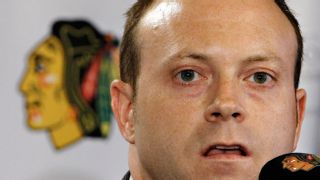|
Earlier this month, Ottawa Senators general manager Bryan Murray revealed in an emotional television interview that he is battling stage 4 colon cancer. That didn't stop him from showing up at last week's GMs meetings in Toronto. He put off a chemotherapy session to tackle mundane tasks such as discussing the dry scrape. He just went to work, as he always does. Business as usual. Chicago Blackhawks GM Stan Bowman can relate. Bowman is not far removed from his own battle with cancer. In 2007, he was diagnosed with Hodgkins lymphoma, when he was just 33 years old.  Working, remaining involved in the daily activities of the NHL world, was a comfort to Bowman. It kept his mind engaged and his routine steady. He was able to show his two young boys, then just 2 and 5 years old, that their dad was still Dad. That some semblance of normalcy remained. "I wanted them to have the illusion that things were going well," Bowman told ESPN.com. "Life goes on, and you can't feel sorry for yourself." Bowman didn't have serious bouts with nausea or any of the more grisly physical side effects that come with treatment. He said the hardest part for him was the fatigue. Twice a month, he would go in for chemotherapy treatment on a Wednesday. The Thursday and Friday immediately after that treatment were days in which he would stay home to rest and recover. But by that following Monday, Bowman would be back to work and feeling better. It became a new type of normal. "That's what you do in life," Bowman said. "The hockey part of it was a way to bring things back to a normal life. If you get too fixated on the illness, it's not good for anybody. Mentally, [hockey] gave me something to be excited about and a way to get back in a normal routine, which for us, that's going to games, watching games, interacting with players." Even when Bowman's cancer came back in 2008 and he had to undergo a stem-cell transplant, he remained positive. When his doctor called to tell him the news the second time around, he was watching the Winter Classic between the Pittsburgh Penguins and the Buffalo Sabres. Knowing that this next round would require more aggressive treatment, he explained to his then-tenant, a 19-year-old Patrick Kane, that he'd understand if Kane wanted to relocate with all that was going on in the Bowman home. Kane was puzzled. "Are you kicking me out?" he asked Bowman. Bowman chuckled when recalling that conversation now. Kane, who had become like a big brother to Bowman's sons, told him: "I want to stay. I like it here." "In a lot of ways, that just goes to show you that you stick together in tough times," Bowman said. Which is what the hockey community -- a tight-knit, fraternal order -- will do in the wake of Murray's revelation. Murray told reporters last week that several people had reached out to express their support for him. Bowman was glad to see Murray speak out about his condition. That holds especially true, Bowman said, because so many people have their lives affected by the disease. Friends, family members, colleagues, loved ones. "People are always sort of reticent and don't know what to say," Bowman said. "I was never afraid to say anything because everyone goes through this, whether it's yourself, family, friends, it's not something you should be afraid of talking about. Part of it is be willing to give advice and share experiences to other people." And Murray's revelation has apparently already helped others. Murray, who wanted to get the word out about preventative screenings, said that a nurse at a local Ottawa clinic told him people have come in after hearing his message to get themselves checked out. Bowman applauded Murray for using his public platform to inform others and hoped his fellow executive is able to stay in the moment surrounded with support. Bowman remembered the people who helped see him through the challenging times. His parents, in particular, were around a lot in Chicago (his dad is Scotty Bowman). Not necessarily to have any sort of philosophical discussions, he said, but just to help him and his family get through the tough days. Those beginning days, the first few weeks, were the toughest, Bowman recalled, but eventually people adapt. "I know it sounds strange, but after the fact, you can look back on it with a different perspective," Bowman said. "I was fortunate. I'm a pretty upbeat person. I like to try to stay calm if things aren't going your way. ... When you do get sick, it's not something anyone wants, but at the same time, you fall into a new routine and it becomes ordinary." "Maybe it's part of the human spirit," Bowman said. "We find a way to get through it."
|

